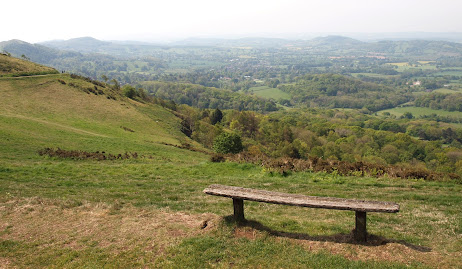In his Introduction to the Oxford World’s Classics edition of Rousseau’s Reveries of the Solitary Walker [1], Russell Goulbourne writes:
For Rousseau, ..musings and movement
go hand in hand. Walking is.. ..thought-inspiring: ‘Seated at my table, with my
pen in my hand and my paper in front of me, I have never been able to achieve
anything. It is when I am out walking among the rocks and the woods, it is at
night, sleepless in my bed, that I write in my head’. This link between musings
and movement.. ..is fundamental to the Reveries.. ..since Rousseau based
his text on notes he had scribbled down on twenty-seven playing cards while out
walking..
A similar approach to the creative impulse provided by solitary walking in the countryside was described by Edward Elgar, who also enjoyed riding a bicycle over the lanes and tracks of Worcestershire and, especially, the Malvern Hills (see above). In a letter from Malvern on 11th July 1900 to A.J.Jaeger (“Nimrod” of the Enigma Variations), Elgar writes, describing a musical phrase [2]:
This is what I hear all day – the
trees are singing my music – or have I sung theirs? It’s too lovely here.
Unfortunately, I don’t have the genius of Rousseau or Elgar,
but I understand their sentiments. For me, walking through the countryside has
always been my favourite exercise (I never learned to ride a bicycle) and provides
a source of freedom from day-to-day problems. It is more that that, though, in
that it enables me to appreciate the natural world and to observe closely all
the changes that occur through the year. Like Rousseau and Elgar, my walks are
also a time when ideas come to the fore – perhaps for a different way of looking
at something, or for generating ideas for a new talk, or blog post.
Early morning walks in summer are especially uplifting and I
have recently discovered that short video clips act as aides-memoires. Being a
technophobe, I have only recently started using the video recorder on my mobile
telephone and the clip below shows a section of country lane that opens to
reveal a pretty cottage with well-kept gardens on either side of the road. This
has always seemed odd to me, as I am not a gardener and I prefer the wonderful
complexity of natural world as it is – there’s no doubting that it is
attractive, though.
Further in the dawn walk, I headed through a field and took
a path into a wood. The transition appealed to me, so I took a video as I
walked from the one to the other and the clip can be viewed below, complete
with soundtrack:
My experience was very similar to that of Geoff Nicholson
[3]:
Even as I was falling I thought,
Oh crap, I’m not going all the way to the ground, am I? I’ll stop myself
somehow. I’ll keep my footing. I’ll regain my balance. And then I knew I was
mistaken about that. I was going all the way. I’d passed the tipping point. Oh
crap indeed.
Then there was the impact, a much
greater, more generalised blow than I’d been anticipating. I was on the ground,
winded, hurting all over, feeling like a fool, trying to breathe deeply and
regularly, and thinking.. ..’Oh man this really, really hurts, this is a bad
one’.
Nicholson broke his arm, but I was luckier as I only had cuts on
various parts of my face and arms and a badly swollen hand. Once I had
recovered a little, I gingerly pushed myself up and then sat for a while on a
tree stump before walking the 2 km to my home. A visit to the hospital later in
the day revealed a dislocated, and broken, little finger that required surgery
under general anaesthetic and, as I write, my hand and lower arm are in plaster and
I await the verdict of the medical team as to the extent of healing.
I was a fool to concentrate on making the videoclip and not
looking where I was putting my feet. A lesson learned, certainly, but I so look
forward to going out on more solitary walks in the countryside. Despite recent
evidence, thy are good for me…
[1] Russell Goulbourne (2011) Introduction. Reveries of the Solitary Walker by Jean-Jacques Rousseau. Oxford, Oxford University Press.
[2] Percy M. Young (1956) Letters of Edward Elgar and Other Writings. London, Geoffrey Bles.
[3] Geoff Nicholson (2010) The Lost Art of Walking. Chelmsford, Harbour.
My thanks to Anna Easton for her advice on the use of
videoclips.


No comments:
Post a Comment